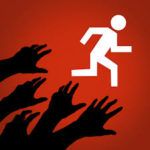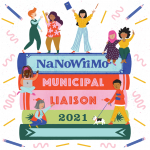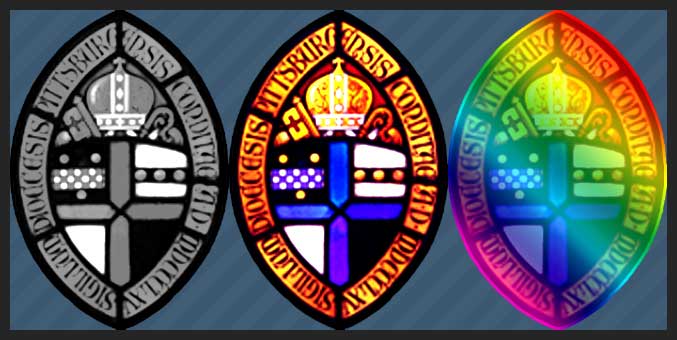
Civil marriage is very different from matrimony, although the two have become somewhat intertwined over the years. The fight for marriage equality is for civil rights: building a life together, joint property and taxes, medical powers of attorney, all the really boring but important things that seem to take effect during an emergency, as well as the social recognition of your spouse and validation of the important of that relationship.
But that is separate from the ceremony/sacrament of matrimony performed in a house of worship. True, a member of the clergy may file a marriage certificate to the state, but that is just as often done by a judge, justice of the peace or other officer with legal standing in their place, and the marriage certificate is a legal, not religious document. Matrimony is the faith’s recognition of a legal relationship, the two can just be taken care of in the same ceremony if the couple wishes.
Religions are free to decide for themselves what constitutes a union they would like to bless, with or without the state’s approval. Already, we have seen some churches like the Universal Unitarians who fully endorse and bless same-sex marriages, and are a great flip to the right-wing talking point that marriage equality impedes religious freedoms: the state’s refusal to recognize marriage equality impedes the freedom of religious institutions that wish to recognize them. And yes, that is a stretch, since faiths are free to generally do what they like, but it’s a good counterpoint in a pinch.
But this post is not about either end of the spectrum, it’s about the messy middle, the conversations happening there, and what we lose by not recognizing the dignity of us all.
The Episcopal Church, and specifically the diocese of Pittsburgh, has been one of the epicenters of the maelstrom of same-sex matrimony. The diocese of Pittsburgh itself is massive, covering 11 counties, so it covers a wide berth of viewpoints and the state.
For those not following the politics of the Episcopal Diocese of Pittsburgh (read: everybody), here’s the condensed version: In 2003, Bishop Gene Robinson, an openly gay man in a committed relationship, was confirmed by the General Convention and then consecrated a bishop in New Hampshire. The bishop of Pittsburgh, Robert Duncan was very vocal in his displeasure at this.
In 2008, after Duncan criticized the Archbishop of Canterbury and worked to start a schism, along with other various offenses, he was deposed by the Episcopal Church. He then formed the Anglican Church in North America and was elected their first archbishop and primate, although whether or not his church will be fully recognized by the See of Canterbury has yet to be seen.
At the 2009 General Convention, a “Blessing of Same Sex Union” 1was approved, which included my former (now retired) rector as an author. The General Convention approved its use, contingent on the consent of the local Bishop.
After going through a lengthy and very public lawsuit process (to get our property back that Duncan’s new church was trying to claim as their own), the Episcopal Diocese of Pittsburgh went through a search process and selected Bishop Dorsey McConnell.
Bishop McConnell, knowing he was coming into the maelstrom of Pittsburgh, decided to take an inquisitive approach, putting in place a series of discussions to discuss the matter and come to an agreement as to whether or not to offer the blessing ceremony. That agreement, would not dictate his final decision however, but more served as a barometer for him to take into consideration.
I personally found the discussions themselves to be insulting. We’ve spent a decade discussing this in Pittsburgh, and we were finally moving on and putting the harmful past behind us. A new bishop, at least to me, was a fresh start, a chance to move forward and continue to heal, not reopen these wounds.
But instead, we had this period of discussion where both sides were required to be represented equally, a requirement which was found to be difficult to fulfill: opponents against same-sex matrimony either are few and far between or did not want to discuss their position, even in groups of completely like-minded individuals (the first stage of this three-stage process was discussions in groups where all participants agreed on their position, to better understand the process to be followed in stages two and three).
I would have thought this would have been an indication as to where the diocese was, but onward we trudged through the rest of the process, Episcopalians, if nothing else, love tradition and ceremony (and to drink. Seriously, we love to drink). Bishop McConnell’s decision was actually delayed as he spent more time going over the discussion groups’ findings, and while it appears he showed some restraint in his letter to the diocese, it is apparent where he falls on the issue. He addressed the diocese in this pastoral letter and accompanying writings 2.
Bishop Dorsey does not want this to be seen a stepping stone to matrimony, and shows a strangely sex-obsessed viewpoint, writing that “There is no reference to bodily union” in the same-sex blessing ceremony. I’m typically used to observing sex-obsessed theologians in the Catholic Church, not the Episcopal, so I was caught off guard by the comment.
I suppose reference to bodily union could have been inserted (okay, I have the mentality of a five year old) into the ceremony, that is of course, unless the Bishop feels that only cis-man/cis-woman intercourse is allowable bodily union: I can guarantee there is plenty of “bodily union” in same-sex relationships, but again, why this obsession with gay sex? Seriously, I have a hard time when opponents of LGBT rights think about gay sex more than I do.
Bishop McConnell writes, discussing at length the subject of children in matrimony, and in the rite itself. He questions what type of love is being revealed through the same-sex blessing, apparently not able to understand love and commitment outside of rearing children.
The Bishop continues:
“The couple signifies the totality of humanity, representing the image of God – once shattered in Eden – now restored in Christ.”
Before we get to the meat of this sentence, let’s remind everyone, that the first 12 chapters of the Bible are myth, myths that every culture and religion have in some form: Creation (go back and read Genesis, the world is created twice, in different orders each time), original sin/cast out of paradise, flood and the scattering of people/languages (tower of Babel). So it’s great to look back on and pine for the paradise of Eden, but it is still a (remarkably common) myth.
Now, if this is a backhanded reference to procreation, as Adam and Even apparently went on to populate the Earth, I’ve never known the Episcopal Church to deny matrimony to couples past menopause, or even those not wishing to have children. But I take this more of a slap to the face that same-sex couples are somehow not equal to heterosexual couples.
As academic biblical scholars, we wish to clarify that the biblical texts do not support the frequent claim that marriage between one man and one woman is the only type of marriage deemed acceptable by the Bible’s authors.
So, while it is not accurate to state that biblical texts would allow marriages between people of the same sex, it is equally incorrect to declare that a “one-man-and-one-woman” marriage is the only allowable type of marriage deemed legitimate in biblical texts.
This is not only our modern, academic opinion. This view of the multiple definitions of “biblical” marriage has been acknowledged by some of the most prominent names in Christianity. For example, the famed Reformationist Martin Luther wrote a letter in 1524 in which he commented on polygamy as follows:
“I confess that I cannot forbid a person to marry several wives, for it does not oppose the Holy Scriptures.”
Accordingly, we must guard against attempting to use ancient texts to regulate modern ethics and morals, especially those ancient texts whose endorsements of other social institutions, such as slavery, would be universally condemned today, even by the most adherent of Christians 3. Perhaps Bishop McConnell doesn’t personally know any gay couples: coming out to friends and family is the most powerful political action a member of the LGBT community can do because it forces others to see us as fellow human beings instead of an abstract concept.
The fight for equality has many fronts, and while basic civil rights and safety are the most important, there is something to be said for religious rights as well. Being able to celebrate love and commitment, with your faith community, is another important validation, not just of your relationship, but your existence as well.
The institutionalized bullying and discrimination that we see so often come from faith communities is very much a contributing factor to the epidemic suicides of LGBT youth. So when we, as a faith community, fight for equality, it’s not only to move forward as a group, but to also save lives. And the influence that the faith community can have on society as a whole is further proof that these internal struggles are important.
It doesn’t have to be like this. Jesus Christ never spoke a word of condemnation against homosexuals. Churches don’t have any need to condemn LGBT people, or fight against our equal treatment in our country. A growing number of church communities have chosen to be affirming and supportive of LGBT people. I have the joy of experiencing this directly in the numerous church groups who send volunteers to cook in our shelters and collect clothing and even Christmas gifts for our young people.
A healthy society prioritizes the safety of children. Decent people do not stand by in silence when children are being abused. We need to recognize that the condemnation of LGBT people in churches leads to the abuse and rejection of LGBT children in far too many Christian homes 4.
“Not all Christians are like that. 5” One of the things I’ve always like about the Episcopal church, or at least my own parish, is that I am welcomed, fully. And while we still have work to do, and while we in Pittsburgh tend to work things out in big, messy, public ways, moving forward to a place where we’re all welcomed in God’s love, without conditions, is what we strive for.
So I hope that while he is here, Bishop McConnell can get to know more of us, not just members of the LGBT community, but the Yinzers we all are: genuine, hard-working individuals, just looking to be treated equally.
I don’t expect Bishop McDonnell to perform any same-sex blessings himself, and I do appreciate him extending the option to each priest, but it still seems like he only begrudgingly allows even that. And the same-sex blessing is not matrimony: while civil unions usually offer the same rights and responsibilities of marriage, without the significance and weight of the word, this blessing ceremony seems to fall much shorter, which is something we can both agree on.
I was the lone Episcopal student at a Catholic college (it was me and two professors), and I spent four years making them examine their faith, defend it, and hopefully be more welcoming in it, all while expressing my love for my own church, one that “never put barriers on God’s love.”
The Episcopal church is a refuge. A place of peace and love. Let’s keep it that way.
I’ve never met the bishop personally. But I would bet that he’s a kind, caring, passionate man. And I certainly appreciate the work that he does. And I don’t want to turn this into a personal attack, but reverse our roles for just a moment: let’s have some “discussions” to figure out if his love, his marriage should be recognized, should be allowed in God’s eyes. Of course that is going to hurt.
But he’s not inside my head. He doesn’t know what it’s like to see a constant barrage of hatred and bigotry thrown at you and your community, just for trying to live your own lives. He does not know how that can damage a person, damage a child. Those aren’t scars one can easily heal from.
And aren’t we a bit presumptuous to proclaim we know what God is thinking, anyway? Yes, yes, he has advanced degrees in theology, and I just took a couple courses during my time at college, so he actually does have a much better grasp on intellectually understanding God and religion. But I still have a hard time moving past God wanting anything except love from us: love for Him and love for our fellow man. Let’s leave the judgement and damnation to Him.
But what if we were to take this back in history a bit. Let’s say we’re discussing interracial matrimony, would we demand that both sides be equally represented?*
I’m sorry, bishop, but your bigotry is showing.
It’s dehumanizing to have “discussions” set up to talk about you, like you’re not in the room, to examine an entire group of people, to pass judgement on them.
Pittsburgh is tired of this debate, and Bishop McConnell had to have known that in coming here. We’ve been through this time and time again, and we were finally healing, finally coming out the other side, putting angry and lengthy legal battles behind us.
It took me a while, but I finally figured out why I was so uncomfortable thinking about attending the discussions, even in my own church. Having to face a group of people, that somehow thinks that I’m broken is not something I would willingly do, not any more.
I’m not broken. This is how God made me. And if you can’t see that, then you can’t see my basic humanity.
I’ve dealt with a lot of hate and intolerance, and I’m not saying the Bishop is approaching this with either consciously. But it is there, whether he wants to acknowledge it or not. When we insist that both sides have equal representation, when one only seeks to damn the other, we’re not in a welcoming place.
Since this is on the Internet, and as I’ve always said, “if you can’t laugh at sex or religion, you’re doing it wrong,” I feel compelled to include a few images to close. Mature? Probably not. But even through their humor, they have some truth to them, and besides, we need to laugh:
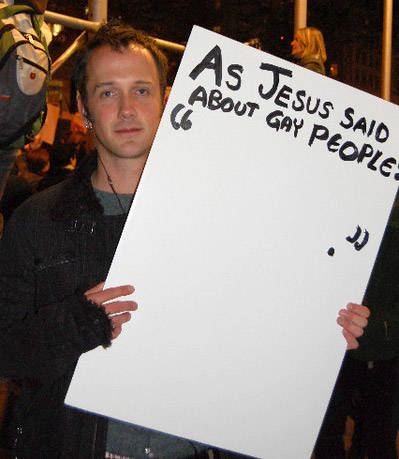
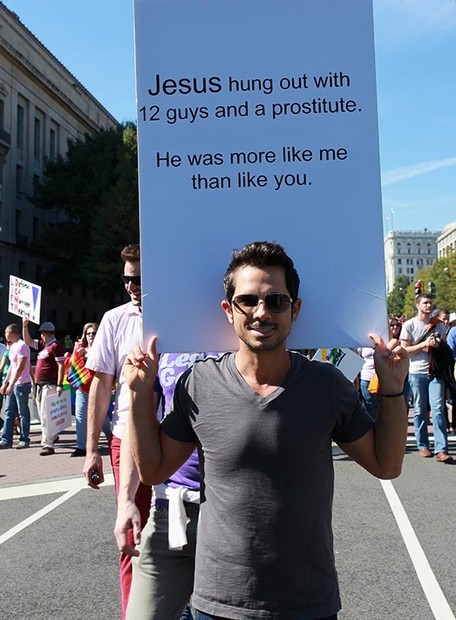

Jesus Christ never spoke a word of condemnation against homosexuals. In fact, I only really remember His message being about love. Love for God, and love for your neighbor.
*I got some great help in researching the history of interracial marriage in the Episcopal Church from @revlucymeg 6 (with assists from @ChurchSnobTEC 7 and @MapleAnglican 8) who pointed me to the correct Canons of the church: in the 1930’s the church adopted canon law to make matrimony correspond with local law, so with the Loving v. Virginia ruling (and probably many priests before that ignored anti-interracial marriage laws), and others around the country as laws evolved, the church was in accord with civil society.
There is a separate Canon stating matrimony is only between one man and one woman, although with the growing number of states that offer marriage equality, a task force is working on the wording of a new Canon to rectify the situation. My guess is we will see that resolution in a the next General Convention.
The views and opinions expressed in posts, articles, or comments published here are those of their respective authors, and do not necessarily reflect the policy or position of Global Entropy as a whole, or that of institutions for which Global Entropy or the respective authors are affiliated.
Share this article
Notes:
- https://www.churchpublishing.org/products/index.cfm?fuseaction=productDetail&productID=9743 ↩
- http://www.episcopalpgh.org/docs/PastoralLetter131125-FINAL.pdf↩
- http://www.desmoinesregister.com/article/20130603/OPINION01/306030016/Iowa-View-1-man-1-woman-isn-t-the-Bible-s-only-marriage-view?gcheck=1 ↩
- http://www.towleroad.com/2013/03/lgbt-homeless-youth-describe-rejection-from-christian-households-videos.html ↩
- http://notalllikethat.org/ ↩
- https://twitter.com/revlucymeg ↩
- https://twitter.com/ChurchSnobTEC ↩
- https://twitter.com/MapleAnglican ↩



